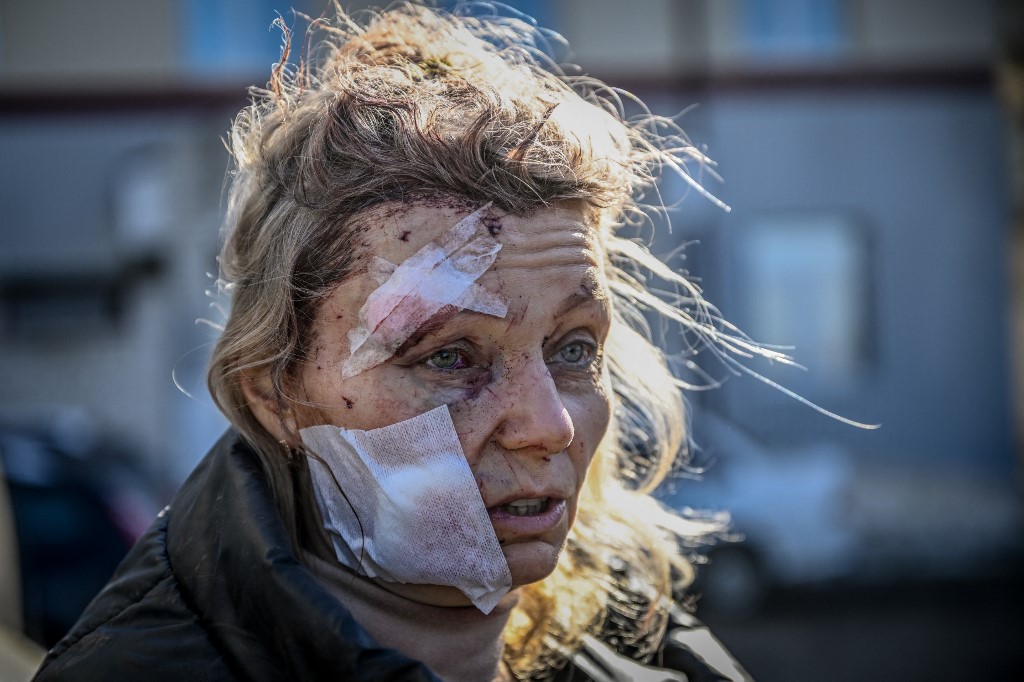by Phil HAZLEWOOD
Agence France Presse
Avdiivka, Ukraine (AFP) — The civilians of Avdiivka in eastern Ukraine have been in the crossfire of fierce fighting since pro-Russian rebels seized control of nearby Donetsk in 2014.

Since Russia’s invasion of Ukraine last February, the once-thriving industrial city of 30,000 in the disputed Donbas region has become a ghost-town.
Those who haven’t fled now hide indoors, huddling in the basements of apartment blocks with no running water or electricity, fearing a direct hit from constant shelling from both sides.
An AFP team visited Avdiivka on February 8.
– Fire and water –
– 8:39 am: the fire in a corner flat at the top of 1 Komunalna Street is still burning from a rocket strike the night before. Thick grey smoke billows from a stairwell window and the flames crackle.
With no fire brigade, the blaze will just have to burn itself out, locals say. Charred debris and broken glass falls softly on the snow below.
– 8:42 am: residents have spent since daybreak two hours earlier filling bottles with water from a communal standpipe.
As if the threat from stray mortars and rockets from both sides wasn’t enough, an elderly woman died recently from carbon monoxide poisoning caused by fumes from a poorly ventilated wood-burning stove, says one.
– 9:09 am: Andriy, 51, hurries away. “Take this,” he says, handing over a crucifix necklace. “It will keep you safe.”
– 9:28 am: Oleksandr Lugovskykh, 35, sits on the edge of his bed in the first floor flat he shares with his cat Tusik.
In the dim light, Lugovskykh cuts an emaciated figure but seems oblivious to the choking fumes from the stove and draws heavily on a cigarette.
He mends saws for a living. But work depends on the daylight hours.
“After 2:00 pm the day is more or less over,” he says. “There’s nothing to do. At 4:00 pm it gets dark.”
Outside, an icy wind has pushed the temperature down to -18 Celsius (-0.4 Fahrenheit). Lugovskykh, a former builder, says the heat from the stove makes it bearable during the day.
But he doesn’t use it at night.
He says he doesn’t understand the aim of the war. “It’s fighting between politicians to show who’s the strongest,” he shrugs.
– Fuel –
– 10:22 am: Svitlana, 49, has been at the only shop in Avdiivka since early morning. She sits listening to the radio among a stock of torches, heavy boots, solar chargers and other items residents ask her to get.
“On average there’s about three customers a day… It’s enough for me to earn a bit of money. I don’t want to rely on aid,” she says.
– 10:56 am: near the bombed-out market, locals gather in an apartment block stairwell, using a generator to recharge mobile phones.
Outside they hold the devices up towards the clear blue sky hoping to get a signal. Sometimes it happens, they say.
A short walk away, Lyubov Stepanova, 71, collects logs and charcoal.
Stepanova has dragged a battered trolley across the snow from the converted basement she shares with 20 neighbours.
“There were 50 of us there but many left,” says the pensioner, who used to work at Avdiivka’s giant coke and chemical plant.
– 11:02 am: in Stepanova’s claustrophobic windowless bunker, Tetyana, 68, massages the arthritic hands and fingers of Galyna, 83, on a makeshift bed under a string of fairy lights.
– Stress –
– 12:31 pm: Vitaliy Sytnyk, 55, takes a break at Avdiivka Central Hospital, the heavy bags under his eyes a tell-tale sign of long days and sleepless nights.
Most of the staff left last year because of heavy shelling, he says. He has been the only doctor since October.
Sytnyk says despite the shelling, the clinic, which is just one kilometre from Russian lines, is well-stocked.
The sound of mortars rattles the window panes. He clasps his hands together and his right leg shakes.
“People are stressed,” he says. “They come and ask for anti-depressants and sleeping pills. As a doctor, I give them. But I tell them, ‘For you to sleep better you have to leave’.”
Outside, he lights a cigarette and shows the bomb damage to two storeys of the hospital, which has forced them to use only the ground floor.
– 1:30 pm: the sound of shelling intensifies nearby and he hurries back inside.
“You should go,” he says, looking over his shoulder.








